Forearm Workout: 4 Best Forearm Exercises
Here, we explain everything you need to know about forearm training! What is commonly referred to as the "arm" actually consists of two parts. The first, the one between the shoulder and the elbow, corresponds to the actual arm while the second, delimited by the elbow and the wrist, is referred to as the forearm.
But what does the latter consist of? What are the bones and muscles that make it up? Now we will go to see in detail everything about this so important part, used continuously in our daily life.
Anatomy of the forearm
The forearm is represented, from a bony point of view, by the radius and the ulna which are articulated both with each other and, proximally, with the humerus and, at the distal level, with the wrist bones.
From a muscular point of view, the forearm is made up of numerous muscles arranged in overlapping layers. We can identify as many as 20, which can be classified in two ways.
The first identifies their anatomical position and distinguishes the muscles into: anterior, posterior and lateral forearm muscles.
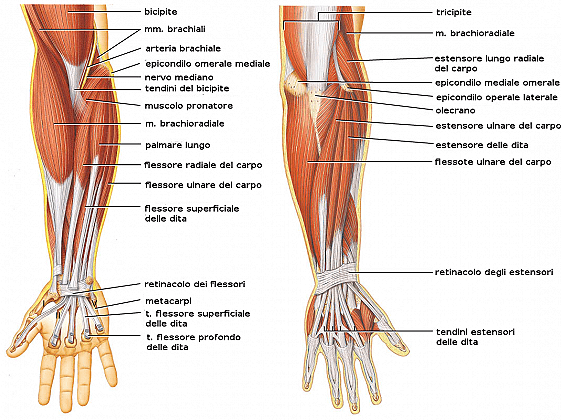
The second classifies them from one point of view functional in: elbow extensor muscles (anconeus), supinator muscles of the forearm (supinator, brachioradialis), pronator muscles of the forearm, all of the anterior muscle group (pronator teres, pronator squares); wrist flexor muscles, also all anterior muscles (ulnar flexor of the carpus, radial flexor of the carpus, palmar long, superficial flexor and deep flexor of the fingers, long flexor of the thumb); wrist extensor muscles (long radial extensor and short radial extensor of the carpus, ulnar extensor carpus, extensor of the fingers, extensor of the index, proper extensor of the little finger, long extensor and short extensor of the thumb); extensor muscles of the fingers (common extensor of the fingers, extensor of the little finger, extensor of the index finger); extensor muscles of the thumb (long and short extensor of the thumb); abductor muscles of the thumb (long abductor of the thumb).
Of course, to some of the muscle flexion and extension actions listed above, other muscles also participate, but anatomically they are not part of the forearm region.
How To Train Your Forearms?
Training for the development of the upper limbs is often focused on the biceps and triceps only, leaving out the forearms with the excuse that they are already training by doing deadlifts and rowing.
In fact, some lucky ones manage to develop impressive forearms simply by grabbing heavy barbells and dumbbells and don't need a lot of direct work.
However, they are a genetically fortunate minority in that respect, while most of us have the opposite problem: good biceps development, but ballerina forearms.
The good news is that the forearms respond very well in both size and strength with constant hard work.
Let's see some exercises that you can incorporate into your training routines.
1. Reverse Curl
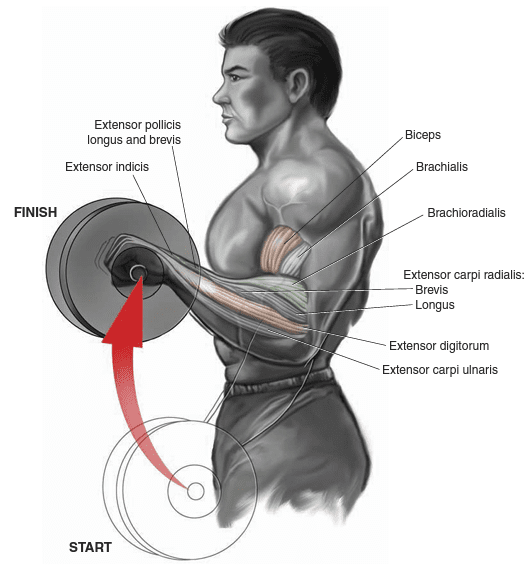
Standing, legs slightly apart, arms straight, hands in pronation, i.e. thumbs turned inwards, inhale and flex the forearms.
This exercise allows you to work the wrist extensors: first radial, second radial, common extensor of the fingers, proper extensor of the little finger and ulnar extensor of the carpus. It also stresses the long supinator, the anterior brachialis and, to a lesser extent, the brachial biceps.
2. Wrist Curl
Sitting on a bench, place your forearms in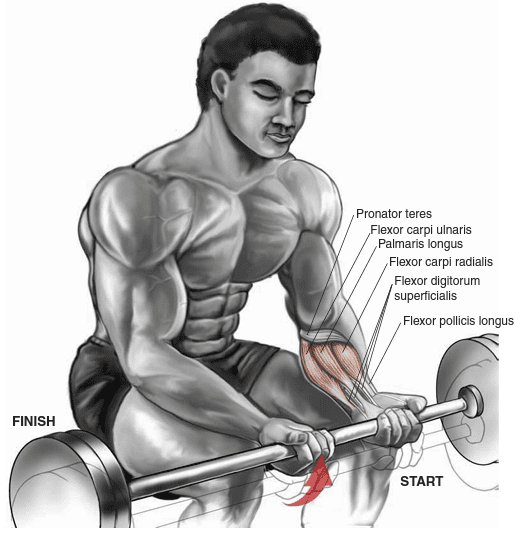 support on the legs or on the bench itself, with the palms of the hands in supination, that is, facing upwards. Hold a barbell by doing push-ups of the hands on the forearms.
support on the legs or on the bench itself, with the palms of the hands in supination, that is, facing upwards. Hold a barbell by doing push-ups of the hands on the forearms.
This exercise primarily stresses the forearm flexors and in particular the radial flexor of the carpus, the long palmar, and the anterior cubital. The flexors of the fingers play an accessory role.
3. Reverse Wrist Curl
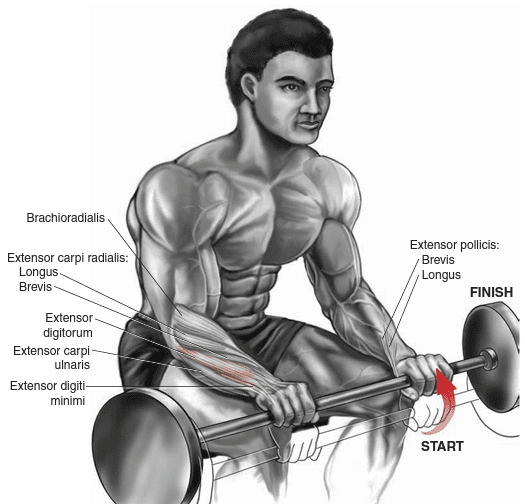
One of the most important forearm training exercises is called the Reverse Wrist Curl. Sitting on a bench, place the forearms resting on the legs or on the bench itself, with the palms of the hands in pronation, that is, facing downwards. Hold a barbell with a distance between the wrists slightly less than shoulder width. Carry out hand extensions on the forearms.
This exercise focuses mainly on the extensors of the forearm, especially the external radial (first and second) and the posterior cubital. Adequate involvement also occurs by the flexors and extensors of the fingers.
4. Wrist roller
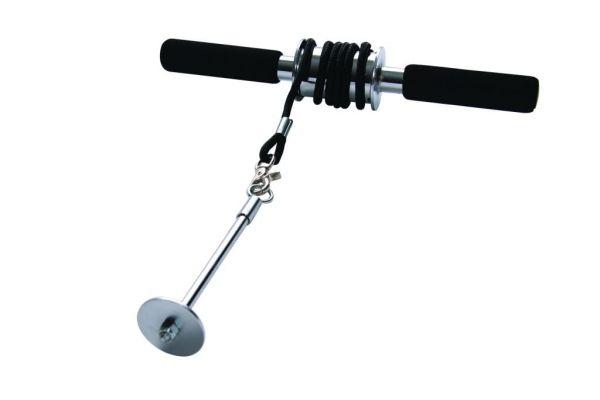
Perform this exercise with a stick with a rope attached in the center and a weight attached to the other end of the rope. Grab the stick at both ends with a prone grip.
Using only your forearms and wrists, roll the rope onto the stick until the weight reaches the stick, then unwind the rope from the stick until the weight reaches the floor
Conclusion
Forearm training is Big, muscular forearms are a sign of masculinity and are a part of our body in sight for much of the year; they must therefore be given the right attention in our training.
In addition, the forearms not only have the function of flexing and extending the wrists, but also contract statically (along with the hand muscles) to help grip heavy objects.
Weak forearms could therefore be a limiting factor. If the grip is lacking, the amount of weight that can be used on deadlifts, rows, pull-ups and other brute force exercises will be less. Guess how many successful strongmen have a weak grip: none.
Not only deadlifts, rowing and direct bicep work are enough to develop forearms as an arm wrestling, you also need to train them specifically. Among the best exercises that can be performed we have seen the reverse grip curl, the wrist curl, the reverse wrist curl and the wrist roller.
In addition to these, in a future article, we will talk about the best exercises to get a steel grip. Don't let your forearms be your weak link. Take some time to develop them. You will reap more benefits than you can imagine.


























